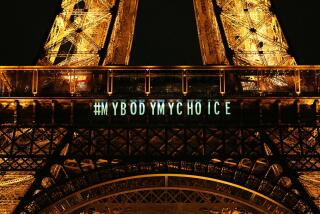Current Ban Is Loosely Enforced : Belgium Reconsiders Legal Abortions
- Share via
BRUSSELS — Dr. Francoise Kruyen once tried to persuade two men at a public meeting that Belgium should legalize abortion. She did not tell them she had performed abortions on the wife of one and the daughter of the other.
Abortions are outlawed in Belgium, but at least 15,000 women undergo the procedure every year, according to a spokeswoman for 19 nonprofit clinics that openly offer abortions as well as family-planning advice.
Doctors like Kruyen talk freely on television about committing what is technically a crime.
“It’s so hypocritical,” Kruyen said in a recent interview. “Women seek abortions for all kinds of reasons and, if they are Catholic, they say their case is special.”
Belgium, where the Roman Catholic Church is influential, is the only European country apart from Ireland where abortion is still banned. However, the ban may soon be lifted after decades of struggle by feminists and a handful of doctors and politicians.
New Legislation
New legislation allowing abortions in the first 12 weeks of pregnancy for women in “conditions of distress”--worded vaguely to mean anything from financial worries to psychological problems--may become law by the end of the year.
Approved by the Senate’s health committee in May, the draft bill goes to a vote in the full Senate and Chamber of Deputies in the fall.
“There is a feeling that Belgium, with its repressive legislation, has become a sort of island in the middle of Europe,” said Francis Delperee, a political scientist at the Catholic University of Louvain-la-Neuve.
The fact that the ban, dating from 1867, is ignored in most French-speaking parts of Belgium and in some Dutch-speaking areas has helped soften resistance to reform.
Forced to Go Abroad
Although many authorities turn a blind eye to abortions, others prosecute, forcing thousands of women to travel abroad, especially if they live in Flanders, the Dutch-speaking north of the country where Catholic disapproval is strongest.
One couple, who declined to be identified, said they had driven to the village of Groede in the Netherlands “from somewhere in Flanders” for a 15-minute abortion operation that no doctor would provide them at home.
Doctors at the clinic, a 20-minute drive from Belgium’s eastern border, say the vast majority of the 1,359 abortions it performed last year were on Belgian women.
Three doctors in the conservative stronghold of Ghent received one-month suspended jail sentences in November after Belgium’s attorney general successfully appealed their acquittal for performing abortions on women in “extreme distress.”
In Brussels, however, psychologist Renee Coen says the center at the Free University where she works has not been visited by police for five years.
Compounding the Trauma
“Women are already traumatized by the need to have an abortion, and the risk of being prosecuted only makes things worse for them,” Coen said.
The latest pro-abortion bill has come closer to success than any of its predecessors because of a 1988 coalition pact allowing members of Parliament to vote according to their conscience on abortion rather than along party lines.
The man who could still wreck a deal, however, is Herman van Rompuy, chairman of Prime Minister Wilfried Martens’s Flemish Christian Democratic Party, which believes an embryo is a human being from conception.
Van Rompuy refuses to clarify whether the senior coalition party would be prepared to bring down the government over the issue of abortion. All he says is that his party will reconsider its position after the full Senate vote.
More to Read
Sign up for Essential California
The most important California stories and recommendations in your inbox every morning.
You may occasionally receive promotional content from the Los Angeles Times.










